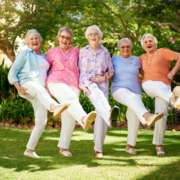A Guide to Healthy Living for Seniors
What is Healthy Living for Seniors
As you grow older, you go through many changes, and you may need to adjust your lifestyle for healthy aging. Our minds and bodies undergo a wide variety of mental, emotional, and physical changes. While some aspects of life may become more difficult, active living for older adults is still well within reach. In this guide to healthy living for seniors, we’ll explore the many ways you can live a full, satisfying life well into your golden years. Healthy eating and regular physical activity can be keys to good health at any age. Making suitable lifestyle choices may also prevent some health problems, such as diabetes, heart disease, and some cancers.
What foods should seniors avoid?
Food plays a central role in all of our lives. Eating is both a way to sustain ourselves and an important part of our culture. People often mark major life events with a large feast from wedding cakes to birthday cakes, beautiful holiday spreads with family to casual lunches with friends. As adults age, they need fewer total calories, but higher amounts of some nutrients, especially calcium and vitamin D. In terms of nutrition, you need to focus on quality, not quantity. For both optimal physical and mental health, older adults truly need to make every calorie count.
Here are foods that you should cut down on (or avoid eating altogether) as you get older, and why:
- Raw or undercooked eggs, meat, and poultry.
Undercooked foods such as eggs, meat, poultry, and sushi can cause food poisoning, which can trigger sepsis and septic shock. Although anyone can develop infection and sepsis, seniors are at higher risk.
- High-sodium foods.
Too much salt can be a problem for older adults, especially if you have a history of hypertension. If your food is lacking flavor, try adding different types of herbs and spices rather than loading up with table salt. Additionally, always review the sodium content on nutritional labels.
- Caffeine.
Caffeine not only keeps many people from getting a good night’s sleep, but it may also increase anxiety and make your heart beat more quickly or irregularly. This could be dangerous if you have a heart condition. Caffeine can also be found in many teas, some sodas, chocolate, and even some medications, including over-the-counter pain killers.
- Sodas and sugary drinks.
Excess sugar also leads to obesity and other health issues. An ice-cold cola may seem tempting if you’re hot and thirsty, but sodas and many sports drinks contain a large amount of sugar. A cola can contain 39 grams of sugar in one 12-ounce serving, the equivalent of almost 10 teaspoons of sugar! If you have prediabetes, regular consumption of these types of drinks may raise your blood sugar to a diagnosis of diabetes.
- Alcoholic beverages.
Enjoying an occasional alcoholic beverage is harmless for many people. However, if you live with a chronic illness, such as diabetes, or you take certain types of medications, such as antihistamines, painkillers (analgesics), and medications for hypertension (high blood pressure), alcohol should be avoided.
Why is keeping a healthy weight important?
Aim for a stable weight as you get older. People of all ages need protein for strong, healthy bodies. Some older adults do not get the protein they need to maintain muscle mass, fight infection and recover from an accident or surgery. Keeping a healthy weight may help improve your health. The weight that is healthiest for you may be higher than that of a younger person. Ask your health care professional what a healthy weight for you may be.
Sometimes older adults feel lonely, sad, low, or stressed because of life changes, loss of loved ones, health problems, caring for other family members, or financial issues. Being good to yourself may help you improve your lifestyle habits, your “get up and go,” and your ability to cope with the demands of daily living.
Here are some ideas for being good to yourself
- Stay in touch with family, friends, or former coworkers to stay engaged and to keep your spirits up.
- See your health care professional regularly and share any concerns.
- Get enough sleep.
- Join a walking group or another social group.
- If you are retired, pursue a new hobby or volunteer to help keep you active and social.
- Surround yourself with people you enjoy.
Remember, it’s never too late to improve your eating habits, become more physically active, and be good to yourself for a healthier life. Strengthening your immune system and staying active can keep you healthier and make you less susceptible to illnesses throughout the year. You are never too old to enjoy the benefits of improved nutrition and fitness. With nutrient-rich foods and activities with friends, you can feel an immediate difference in your energy levels and enjoyment of life. In fact, as we get older, our food and activity choices become even more important to our health.
Disclaimer
The information, including but not limited to, text, graphics, images and other material contained on this website are for informational purposes only. The purpose of this website is to promote broad consumer understanding and knowledge of various health topics. It is not intended to be a substitute for professional medical advice, diagnosis, or treatment. Always seek the advice of your physician or another qualified healthcare provider with any questions you may have regarding a medical condition or treatment before undertaking a new health care regimen, and never disregard professional medical advice or delay in seeking it because of something you have read on this website.
References:
https://www.healthline.com/health/flu/boost-immune-system-over-65#quit-smoking

